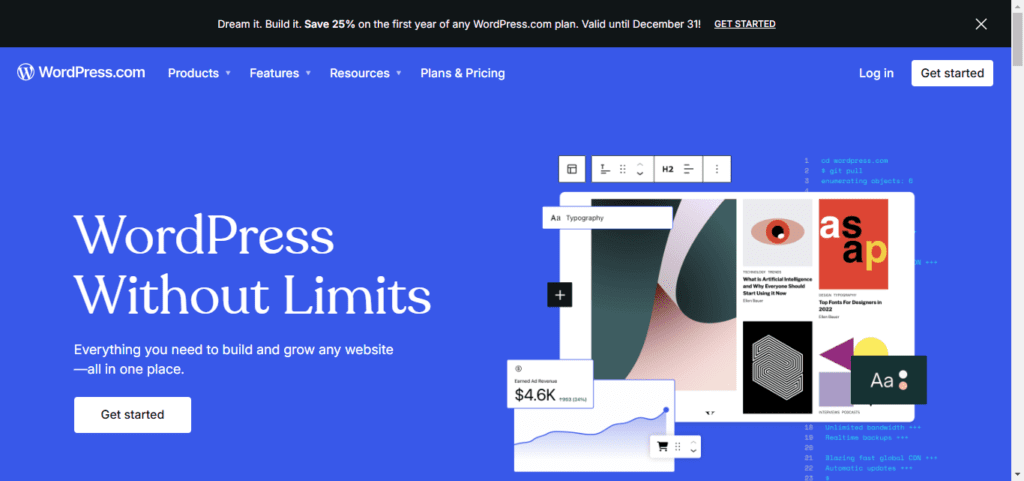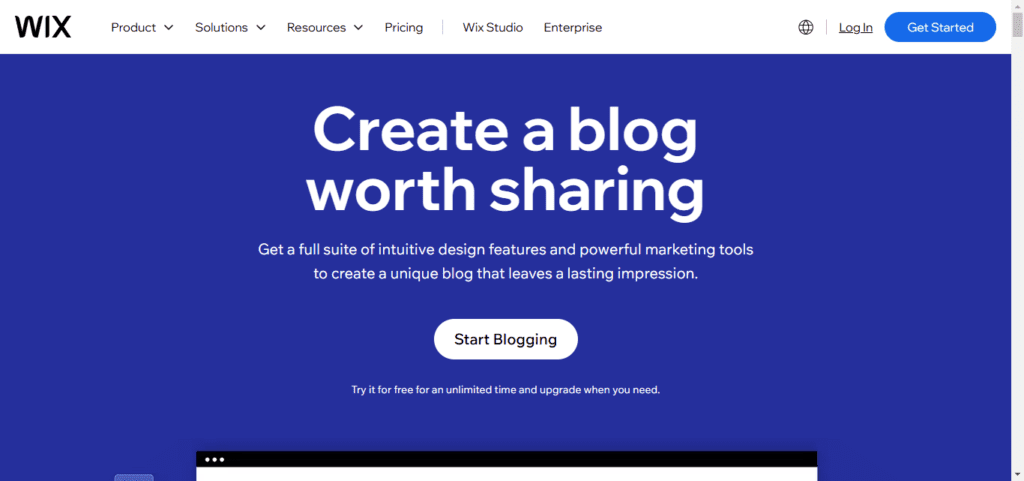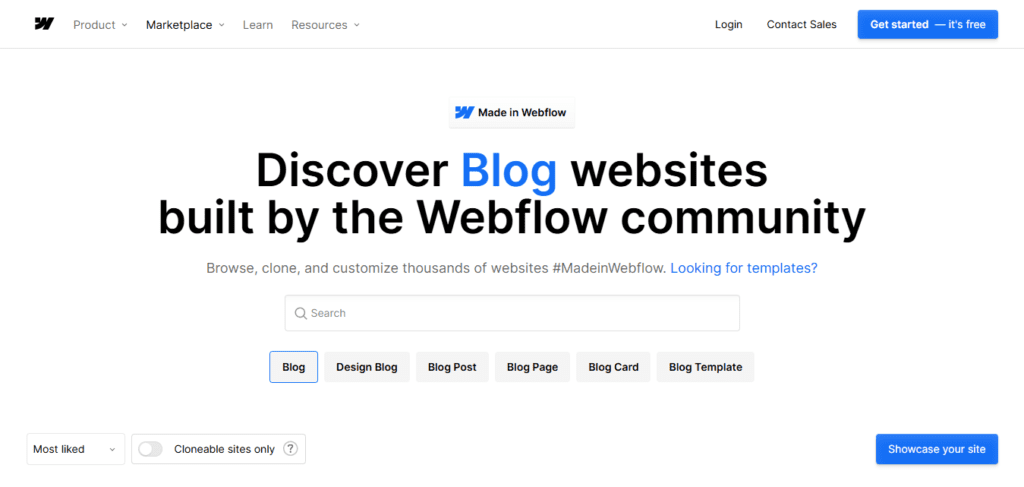
Search engine optimization (SEO) can make or break your blog’s success. But did you know your choice of blogging platform directly impacts your ability to rank? The right foundation gives you clean code, fast load times, and built-in SEO tools, while the wrong one can hold your content back no matter how many keywords you optimize.
We tested and scored the top platforms to find the absolute best blogging solutions for SEO. Whether you’re a beginner blogger or a seasoned content marketer, this breakdown reveals:
- Hidden SEO advantages (and limitations) of each platform
- Surprising performance differences in speed and indexing
- Which platforms give you total technical control vs. easy automation
Here’s what genuinely works in 2025 beyond the usual generic recommendations.
What is the best blogging platform for SEO?
The best blogging platform for SEO is one that allows you to easily customize your blog’s SEO elements and seamlessly integrate with other third-party apps or plugins to offer you the best possible SEO features.
In general, a blogging platform is a (CMS) Content Management System where you manage your blog site (website) and customize your blog pages and posts the way you want.
It doesn’t require coding since you can use a pre-built site template that you can easily customize.
Features to Help You Determine the Best Blogging Platform for SEO
In general, no matter the type of blogging platform you are going to use, if you want a platform that meets your SEO needs, you must ensure that it possesses the features below;
- Customization
- Mobile Optimization
- SEO Plugins and Tools
- Site Speed
- Sitemap Management
[A]. Customization of SEO Elements
- Meta Titles and Descriptions: Ensure the platform allows you to customize meta titles and descriptions for each post, as these are important for search engine visibility.
- URL Structure: Look for platforms that enable you to format your blog post with clean, customizable URLs (permalinks) that include keywords related to your content.
- Headings and Tags: Make sure the platform supports multiple levels of headings (H1, H2, H3) and allows adding tags and categories to organize content.
[B]. Mobile Optimization
- Mobile Responsiveness: Google prioritizes mobile-friendly websites, so the platform should provide responsive themes that work well on smartphones and tablets.
- Mobile SEO: Ensure that the platform automatically optimizes content for mobile devices and offers mobile previews.
[C]. SEO Plugins or Built-In Tools
- SEO Plugins: Some platforms like WordPress offer SEO plugins (e.g., Yoast SEO or Rank Math) that simplify optimization by guiding you through keyword placement, meta tags, and more.
- Built-In SEO Tools: If plugins aren’t available, make sure the platform offers built-in SEO tools, such as automatic sitemap generation, keyword tracking, and meta tag creation.
[D]. Site Speed and Performance
- Fast Loading Times: Page speed is a crucial ranking factor. Choose a platform that optimizes your site’s performance, provides built-in caching, and minimizes code bloat.
- Content Delivery Network (CDN): Consider platforms that support CDN integration to ensure fast global load times.
[E]. Sitemap Generation and Management
- XML Sitemaps: A platform should automatically generate and update XML sitemaps, which help search engines discover and index your content.
- Sitemap Submission: Look for platforms that allow easy submission of your sitemap to Google Search Console or other webmaster tools.
5 Best Blogging Platforms For SEO
We are going to rank them based on their ease of use, Overall SEO Overview, detailed SEO Overview, and SEO limitations.
- WordPress.org
- Squarespace
- Wix
- Webflow
- Blogger
[1]. WordPress.org [ Free]

WordPress is the best SEO blogging platform, it’s almost just like Google among bloggers and website owners. Since it’s the most used and offers the best customizable features.
WordPress.org is basically free, but requires third-party web hosting to use it. A web hosting service like HostGator is needed to host your WordPress platform, and you need to sign up with your preferred domain name when starting.
WordPress dominates the web, powering 43% of all websites worldwide – that’s over 800 million sites and counting.
WordPress.org SEO Overview
- Customization: Excellent, full control over all aspects.
- Mobile Optimization: Strong, mobile-friendly themes are available.
- SEO Plugins and Tools: Outstanding, many powerful plugins like Yoast SEO.
- Site Speed: Highly customizable for speed, but depends on hosting and theme.
- Sitemap Management: Excellent, plugins automate this process.
WordPress.org Detailed SEO Overview
- Customizable URLs: Excellent, allows full control over URL structure.
- Title Tags and Meta Descriptions: Excellent, with plugins like Yoast SEO and Rank Math.
- Heading Tags: Excellent, full control over heading tags.
- Alt Text for Images: Excellent, easy to add alt text through the media library.
- XML Sitemaps: Excellent, plugins generate sitemaps automatically.
- SEO Plugins/Tools: Excellent, extensive range of SEO plugins.
- Schema Markup: Excellent, plugins support schema markup.
- Mobile Responsiveness: Excellent, many responsive themes available.
- Page Speed Optimization: Good, with plugins and caching options.
- Internal Linking: Excellent, easy-to-manage internal links.
- Robots.txt Management: Excellent, full control over robots.txt.
- Social Media Integration: Good, with various plugins available.
- SSL Certificates: Excellent, easy-to-install SSL certificates.
- Analytics Integration: Excellent, seamless integration with Google Analytics and Search Console.
- Canonical Tags: Excellent, supported by SEO plugins.
- Content Optimization Suggestions: Excellent, with various plugins offering optimization tips.
WordPress.org SEO limitations
- Plugin Dependency: While WordPress is highly customizable, achieving advanced SEO often requires multiple plugins, which can slow down your site if not managed properly.
- Performance Issues: Poorly coded themes or plugins can negatively affect page speed, which impacts your site’s SEO.
- Complex for complete beginners: Setting up and optimizing WordPress for SEO can be complex, and may take up to a month to get used to it, especially for complete beginners.
- Regular Updates: WordPress itself, including its plugins and themes, requires regular updates to keep your site secure and to remain SEO friendly, and this is stressful.
How to start a blog with WordPress.org
- Step 1: Click on “HostGator” to host your blog
- Step 2: Choose your preferred HostGator plan
- Step 3: Choose your preferred domain & complete your sign-up
- Step 4: Within your HostGator account, “Install WordPress” your blogging platform
- Step 5: Within WordPress, choose your blog theme [A Pre-built Site]
- Step 6: Remove, add, or customize the pre-designed pages, and you can also create and customize as many as possible blog posts as you want.
[2]. Squarespace [$16/month]

Squarespace is a popular cloud-based website builder that allows you to create a professional-looking food blog without needing extensive coding knowledge. It offers a drag-and-drop interface, a wide variety of templates, and a vast app market to customize your website the way you want.
It powers over 5 million websites and blogs on the internet.
Squarespace SEO Overview
- Customization: Limited compared to WordPress.org and Webflow.
- Mobile Optimization: Strong, responsive templates.
- SEO Plugins and Tools: Decent, built-in SEO features but fewer tools than WordPress.
- Site Speed: Good, though limited by server-side controls.
- Sitemap Management: Automatic, good for most users.
Squarespace Detailed SEO Overview
- Customizable URLs: Good, allows basic customization of URLs.
- Title Tags and Meta Descriptions: Good, built-in options for basic SEO.
- Heading Tags: Good, supports heading tags, but customization is somewhat limited.
- Alt Text for Images: Good, easy to add alt text.
- XML Sitemaps: Good, automatically generates sitemaps.
- SEO Plugins/Tools: Fair, has built-in SEO tools, but fewer options compared to WordPress.
- Schema Markup: Fair, basic support, but less customizable.
- Mobile Responsiveness: Excellent, all templates are responsive.
- Page Speed Optimization: Good, optimized performance but less control compared to WordPress.
- Internal Linking: Good, allows for basic internal linking.
- Robots.txt Management: Limited, basic control over robots.txt.
- Social Media Integration: Good, integrates well with social media.
- SSL Certificates: Excellent, SSL included with all plans.
- Analytics Integration: Good, integrates with Google Analytics.
- Canonical Tags: Fair, basic support, but less flexible.
- Content Optimization Suggestions: Fair, limited compared to the plugins available for WordPress.
Squarespace SEO limitations
- Limited SEO Customization: While it offers basic SEO tools, Squarespace is less flexible compared to platforms like WordPress, particularly in customizing advanced SEO elements.
- Restricted URL Structure: Squarespace has less flexibility in customizing URL structures, which may not be ideal for complex SEO needs.
- Schema Markup: Limited support for detailed schema markup, restricting the ability to create rich snippets.
- Plugins and Tools: Fewer third-party SEO plugins or tools are available, limiting advanced optimization options.
[3]. Wix [$17/month]

Wix is a leading cloud-based website builder designed to help users create stunning, professional websites with minimal coding required.
Featuring an intuitive drag-and-drop editor, a diverse selection of templates, and an extensive app market, Wix makes it easy to customize and enhance your site to fit your needs..
Wix powers over 222 million websites and blogs on the internet.
Wix SEO Overview
- Customization: Fair, drag-and-drop, but less controlled than WordPress or Webflow.
- Mobile Optimization: Decent, but requires manual tweaking sometimes.
- SEO Plugins and Tools: Basic, some tools, but not as robust.
- Site Speed: Average, can be slower depending on the complexity of the site.
- Sitemap Management: Automatic but not as customizable.
Wix’s detailed SEO Overview
- Customizable URLs: Good, but not as flexible as WordPress.
- Title Tags and Meta Descriptions: Good, built-in tools for basic SEO.
- Heading Tags: Good, supports heading tags, but less flexible.
- Alt Text for Images: Good, easy to add alt text.
- XML Sitemaps: Good, automatically generates sitemaps.
- SEO Plugins/Tools: Fair, has built-in SEO tools, but fewer options compared to WordPress.
- Schema Markup: Basic, limited support for detailed schema markup.
- Mobile Responsiveness: Good, automatically adjusts templates for mobile.
- Page Speed Optimization: Good, but performance can vary based on site complexity.
- Internal Linking: Good, allows for basic internal linking.
- Robots.txt Management: Limited, basic control over robots.txt.
- Social Media Integration: Good, integrates with social media platforms.
- SSL Certificates: Excellent, SSL included with all plans.
- Analytics Integration: Good, integrates with Google Analytics.
- Canonical Tags: Fair, basic support for canonical tags.
- Content Optimization Suggestions: Fair, limited compared to other platforms.
Wix SEO limitations
- Basic Schema Markup: Limited advanced options for structured data.
- URL Flexibility: Customizing URLs is less flexible.
- SEO Tools: Basic tools, fewer advanced features.
- Robots.txt Control: Limited control over robots.txt settings.
- Advanced Optimization: Less support for complex SEO techniques.
- Canonical Tags: Basic support for managing duplicate content.
[4]. Webflow [$14/month]

Webflow is a cloud-based website builder that allows you to create custom websites without coding.
It’s known for its powerful design tools and flexibility, making it a popular choice for designers and developers.
Webflow powers over 4 million users on the internet.
Webflow SEO Overview
- Customization: Excellent, full design and code flexibility.
- Mobile Optimization: Strong, responsive design options.
- SEO Plugins and Tools: Very good, with built-in SEO controls.
- Site Speed: Optimized for fast performance.
- Sitemap Management: Strong, with auto-generated sitemaps.
WebFlow Detailed SEO Overview
- Customizable URLs: Excellent, full control over URL structure.
- Title Tags and Meta Descriptions: Excellent, easy to customize.
- Heading Tags: Excellent, full control over heading tags.
- Alt Text for Images: Excellent, easy to add alt text.
- XML Sitemaps: Excellent, automatically generates sitemaps.
- SEO Plugins/Tools: Fair, built-in SEO features but fewer third-party plugins.
- Schema Markup: Good, supports schema markup with some customization options.
- Mobile Responsiveness: Excellent, highly customizable responsive design.
- Page Speed Optimization: Excellent, highly optimized for performance.
- Internal Linking: Excellent, easy-to-manage internal links.
- Robots.txt Management: Good, can edit robots.txt.
- Social Media Integration: Good, integrates well with social media.
- SSL Certificates: Excellent, SSL included with all plans.
- Analytics Integration: Good, integrates with Google Analytics.
- Canonical Tags: Good, supports canonical tags.
- Content Optimization Suggestions: Fair, fewer optimization suggestions compared to other platforms.
Webflow SEO limitations
- Learning Curve: Webflow offers advanced SEO capabilities, but its complexity can be challenging for beginners, requiring a steeper learning curve.
- Limited Plugins: Webflow doesn’t have a large library of third-party SEO plugins, which limits the automation and enhancement of SEO tasks compared to platforms like WordPress.
- Advanced Customization: While Webflow offers good SEO customization, some very advanced SEO features may require custom coding, which isn’t beginner-friendly.
- Blogging Features: Webflow’s blogging capabilities are less robust compared to traditional blogging platforms, which might affect content-focused SEO strategies.
[5]. Weebly [$10/month]

Weebly is a user-friendly, cloud-based website builder that makes it easy to create professional websites—no coding required. With its simple drag-and-drop editor, responsive templates, and built-in eCommerce tools, you can quickly design a site that looks great on any device.
It offers a drag-and-drop interface, a variety of templates, and a vast app market to customize your website.
Weebly has over 50 million users worldwide.
Weebly SEO Overview
- Customization: Fair, more limited than WordPress or Webflow, but easy to use with drag-and-drop features.
- Mobile Optimization: Good, mobile-responsive themes are available.
- SEO Plugins and Tools: Basic, has built-in SEO settings but lacks advanced tools.
- Site Speed: Average, not as fast as platforms like Webflow or WordPress.org.
- Sitemap Management: Automatic, but with less control over advanced sitemap settings.
Weebly Detailed SEO Overview
- Customizable URLs: Good, allows basic URL customization.
- Title Tags and Meta Descriptions: Good, built-in options for basic SEO.
- Heading Tags: Good, supports heading tags.
- Alt Text for Images: Good, easy to add alt text.
- XML Sitemaps: Good, automatically generates sitemaps.
- SEO Plugins/Tools: Fair, basic SEO tools with limited plugins.
- Schema Markup: Basic, limited support for detailed schema markup.
- Mobile Responsiveness: Good, responsive templates included.
- Page Speed Optimization: Good, optimized performance with built-in tools.
- Internal Linking: Good, allows basic internal linking.
- Robots.txt Management: Limited, basic control over robots.txt.
- Social Media Integration: Good, integrates with social media platforms.
- SSL Certificates: Excellent, SSL included with all plans.
- Analytics Integration: Good, integrates with Google Analytics.
- Canonical Tags: Basic, limited support for canonical tags.
- Content Optimization Suggestions: Fair, fewer suggestions compared to other platforms.
Weebly SEO limitations
- Limited SEO Tools: Weebly offers basic SEO tools, but lacks advanced options and third-party plugins for deeper optimization.
- URL Structure: Limited flexibility in customizing URLs, which can impact SEO performance.
- Schema Markup: Minimal support for adding detailed schema markup, reducing the ability to create rich search results.
- Robots.txt and Canonical Tags: Limited control over robots.txt and canonical tags, restricting fine-tuned SEO management.



